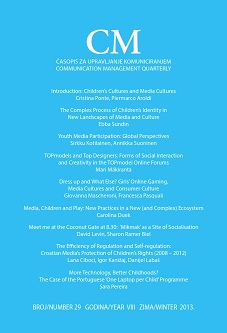More Technology, Better Childhoods? The Case of the Portuguese ‘One Laptop per Child’ Programme
More Technology, Better Childhoods? The Case of the Portuguese ‘One Laptop per Child’ Programme
Author(s): Sara PereiraSubject(s): Media studies, School education, State/Government and Education, Social development, Social Informatics
Published by: Fakultet političkih nauka Univerziteta u Beogradu
Keywords: one laptop per child; child; education; political discourse; information society; technology;
Summary/Abstract: In 2008, the XVII Portuguese socialist government launched the initiative ‘e.escolinha’ as a programme within its ‘Technological Plan for Education’. This initiative aims to ensure access for all primary school children to a personal computer named ‘Magalhães’ with educational content and generalize the use of computers and the Internet in early learning. This paper presents a documental analysis of policy documents, complemented by interviews of policy makers, examining the ways children and children media users are (re)presented. We started from the position that these sources draw on both of these conceptions in order to present the ‘e.escolinha’ initiative, and we are interested in a deconstruction of those notions. Based on questionnaires administered to children aged 8-10 years old, the paper also focuses on the ways children experienced this policy. We find that this policy is more centred on access to technology and the Internet than on children. The child is conceived in terms of his or her future, seen as an adult in the making. Technology is a kind of passport to the future, enabling success in a competitive labour market. In general, the sources reveal an idealised political vision of the benefits of technology for the teaching and learning process and for children’s educational success, which contrasts with both the way the children experienced this policy and mainly with the way that the children use the ‘Magalhães’ computer. We conclude by discussing the importance of taking into account the socially and politically constructed nature of technology and emphasizing the social dimensions of use and access.
Journal: CM Komunikacija i mediji
- Issue Year: 8/2013
- Issue No: 29
- Page Range: 171-197
- Page Count: 27
- Language: English

